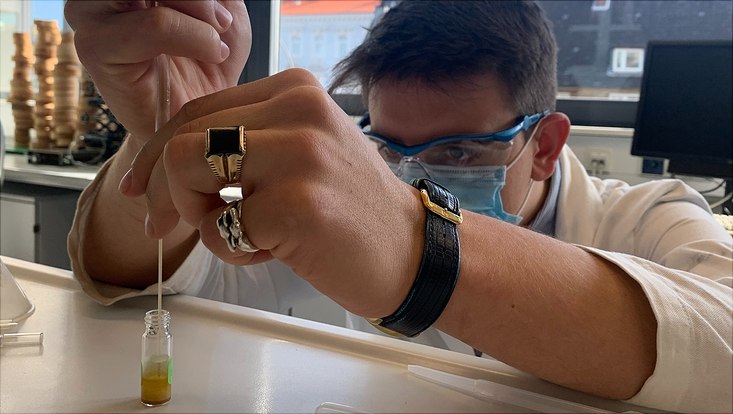Interdisciplinary course on the scent of antiquityAncient History Meets Chemistry
23 September 2021, by Christina Krätzig
Universität Hamburg will be promoting interdisciplinary teaching tandems in Winter Semester 2021/22. These tandems consist of 2 teachers from different faculties or backgrounds who have together developed an innovative teaching format on the topic of mobility. Here, we introduce one of the projects.
Saffron, cinnamon, and rose petals: fragrances were much loved by the wealthy in ancient Greece and the Roman Empire. “They were used for much more than just perfume for an individual person. Back then, people deodorized pets, fabrics, entire rooms, and even buildings like theaters, thermae, and libraries,” says Justine Diemke, who heads the course along with a fellow Department of History colleague and another colleague from the Department of Chemistry.
Diemke is a research associate in the Ancient History subject group and is currently doing her doctorate on the topic of mental illnesses in antiquity. While working with ancient texts, Diemke came across olfactory traces. “There are references about the use of fragrances in many different sources,” Diemke explains. Botanists, doctors, and philosophers from that time wrote about these, passed down recipes, or even criticized the overuse of fragrances. “For instance, Pliny the Elder reported that the Roman emperor Nero had a full year’s harvest of incense burned at the burial of his second wife Poppaea Sabina in 65 CE. This exorbitant use of fragrances was negatively construed,” says Diemke. Individual philosophical schools such as the Stoics and Cynics admonished the use of luxury goods like perfume and, at the same time, were themselves regarded as a less than sweet-smelling group. This was hardly surprising: “Many preached material abstinence and called for a simple life. Diogenes of Sinope, born around 413 BCE, was said to have stayed the night in a refuse bin; he is unlikely to have smelled particularly pleasant,” says Diemke.
Instead of essential oils, scented olive oil was used
However, we do not have any real idea of how it smelled in ancient times. The Greeks and the Romans prepared the ingredients differently from how it is done today. “Today, we extract the fragrances found in plants through distillation—that is, by heating and separating the contained essential oils. Fragrances extracted in this way are intense but also fleeting,” says Skadi Kull, a chemist. “At that time, olive oil was usually infused with ingredients such as rose petals. We do not know how strongly this kind of scented oil smelled or how long it retained its fragrance.”
Experimental imitations of those ancient recipes are the only way to figure out the olfactory reality of that time. Obtaining chemical proof of the fragrances used is not possible. “We do not know how long the raw ingredients were infused in the oil or how they were filtered,” explains Diemke. “Recipes were indeed passed down but without precise instructions on the processes.”
A workshop will demonstrate how to get rose fragrance from rose petals
Together with students of ancient history, the teaching tandem wants to produce perfume oils in multiple workshops. In doing so, students will use ingredients that were available in antiquity. In a first run, they infused olive oil with fenugreek, flower petals, and cardamom seeds for just one day. The resulting oil smelled only faintly of these ingredients. In their next attempt, they will let the ingredients infuse longer. With this approach, they hope to slowly get closer to creating the best scents.
Universität Hamburg—University of Excellence is funding 8 teaching tandems in Winter Semester 2021/22 as part of the further development of the Studium Generale. Each teaching tandem will receive up to €6,000 in funding from the Excellence Strategy of the Federal and State Governments.







